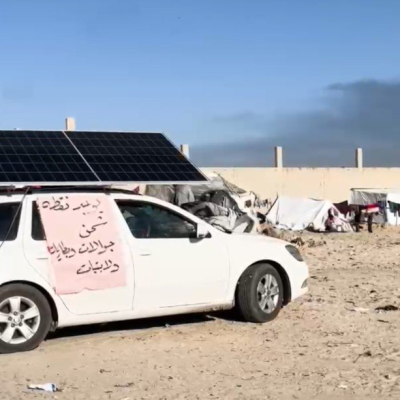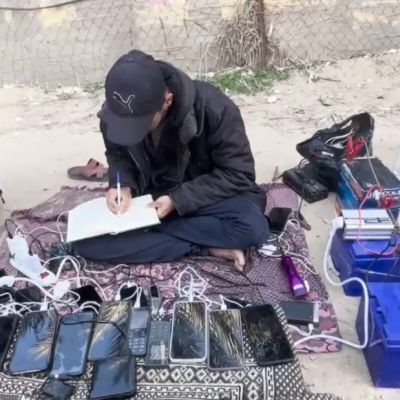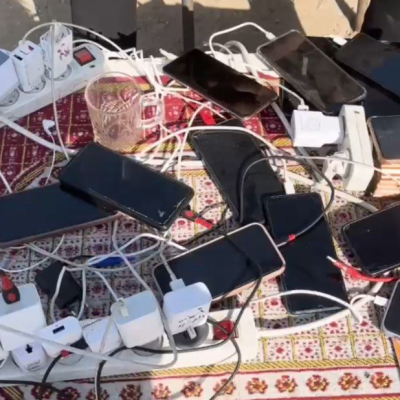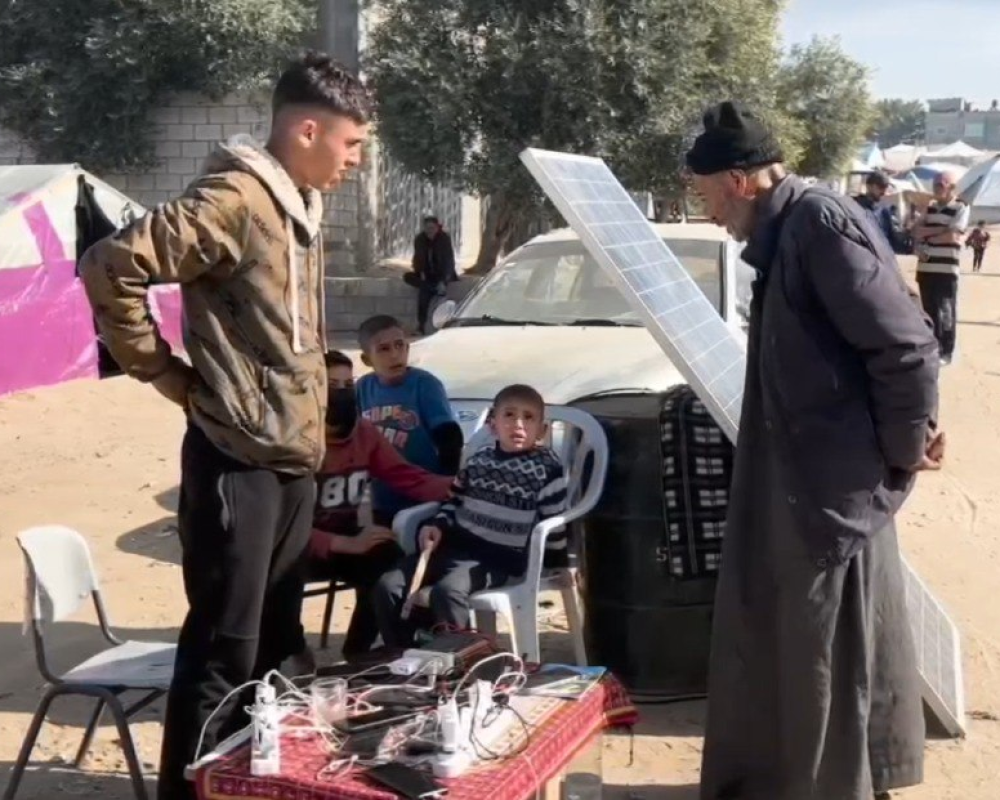
Gaza/PNN /
Palestinians in the Gaza Strip have been enduring the horrors of genocide since October 7, as they face displacement due to Israeli war and bombardment, leaving them homeless and forced to live in tents without basic necessities.
Necessity, the Mother of Invention
In this modern age, where communication devices are ubiquitous, Palestinians have found solace in mobile phones to brighten their nights or connect with relatives for reassurance. However, these devices have posed a challenge, with depleted batteries leaving them without power for days. Some resourceful individuals have taken the initiative to salvage solar panels found scattered amid the destruction, repurposing them into charging stations for a modest fee. These makeshift charging stations have become prevalent on the streets of Rafah in southern Gaza.
In ordinary times, communications play a crucial role. For the citizens of Gaza, who have been dispersed, the situation is dire. Parents don't know the whereabouts of their children, and children are unaware of the location of their parents or relatives. Each one of them fled in different directions amidst the ongoing Israeli genocide.
With power outages, refugees living in displacement tents, and UNRWA schools lacking basic human necessities, mobile phones, once a symbol of communication and life, would be worthless if not for some salvaged solar panels. These panels, extracted from the debris of buildings and structures damaged during the war, have become tools to recharge phones for the displaced, restoring hope as they reconnect with loved ones after being scattered by the ongoing ravages of war.
Citizens like Youssef Hamouda, one of the displaced individuals benefiting from these solar-powered charging stations, express their gratitude. Hamouda acknowledges the positive impact of solar energy provided by generous individuals. Since their contribution, they have been able to illuminate their surroundings at night, extending their support even to people with disabilities. Hamouda reflects on the difficulties they faced, surpassing the limit.
He recounts seeking refuge in a college in search of a safe place. However, here they lack drinking water, electricity, and lighting. Hamouda emphasizes being one of the citizens forced to walk half a kilometer on foot to charge his device for lighting.
He adds that when these solar panels arrived, he and others could charge their phones for just two shekels. The phones are brought at 8 PM and are ready to be collected by 12 AM, illustrating the impact of solar energy on their lives.
In these dire circumstances, where basic amenities are scarce, and citizens face challenges in securing essentials, the generosity of those contributing solar energy serves as a lifeline, allowing Gaza's residents to maintain communication, share hope, and navigate through the challenges of their daily lives.
The Cost of Solar Charging and the Struggle for Communication
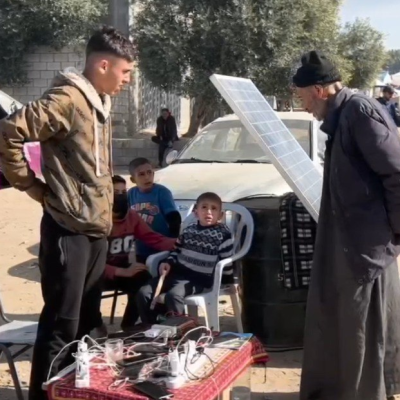
Regarding the cost of charging through solar energy, Hamouda explains that he was compelled to offer charging services for two shekels. He uses the solar-powered device to illuminate his house for three disabled family members. Hamouda emphasizes that he solely uses it for lighting, not for communication, as there is no internet, no cellular coverage, and no means of sending messages in North Gaza. The device is under constant demand in his household.
Hamouda describes his routine of charging phones. In the morning, he delivers the device like others, and each person provides their information. When a phone is fully charged, they place it in a cover for retrieval later in the afternoon.
A displaced individual from central Gaza, Um Ibrahim Darwish, shares her experience of surviving numerous missile strikes in the Maghazi area. When they left the area, they struggled to gather their belongings, especially due to having disabled children and a disabled husband. Fearful of bombings, they left the area with only a few clothes.
Um Ibrahim Darwish describes the challenging life in displacement camps, stating, "Life is difficult, I tell you. I go to neighbors to charge my phone, and sometimes I try to preserve the phone charge for two days. I charge our phones, so my children and I take turns lighting the tent. Where can I get money to charge every day?"
She adds that she has four children with special needs, some suffering from diseases due to polluted soil and a lack of medication and proper nutrition.
Describing the hardship, she mentions that her phone's charge had depleted, and she couldn't find a place to recharge it to contact her relatives. However, solar charging alleviated her suffering, allowing her to reconnect with her family, inform them of her situation, and assure them of her whereabouts.
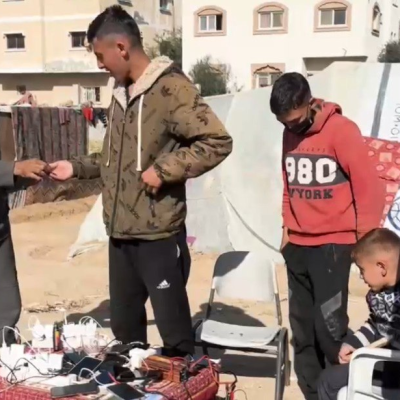
Despite the assistance provided by portable solar energy in generating electricity—the current sole source for charging lighting and phones—Um Ibrahim Darwish points out that the absence of sunlight for long hours during the winter deprives them of electrical energy. Solar panels produce minimal energy when there is no sunlight.
Um Ibrahim Darwish also highlights the financial struggle faced by most families due to the economic downturn. The majority cannot afford daily charging, leading to prolonged and continuous hardship. Occasionally, people help them charge their phones.
Summing up her thoughts on the impact of solar energy, Um Ibrahim Darwish describes the project as crucial. She prays for blessings for those citizens who brought it on their own initiative, offering affordable charging services. However, she notes that sometimes these small amounts of money are not available, emphasizing the financial challenges faced by many.
Insights from Charging Station Owners
Mohammed Abu Shamlah, owner of one of the solar charging stations and also a displaced individual due to the war in North Gaza, shares his story. He explains that the idea originated when they moved to Nusairat, and his father suggested it. Initially, they charged batteries in school and later developed the concept by purchasing a table for charging. Charging for an hour costs one shekel, and they provide charging cables as displaced people lack them and have slow, commercial cables.
Abu Shamlah adds, "I started charging for people, and there is a significant crisis with electricity. Some people go to the hospital and wait for 4 hours to charge their phones, and in the end, they can't charge them."
Mahmoud Al-Jari, owner of another solar charging station, explains that he created a complete and secure solar energy system to charge people's batteries and phones. With electricity cut off for over 100 days, anyone who can charge their phone feels joy as there is no electricity for charging. People have come to him, expressing that they haven't been able to charge their phones for thirty days.
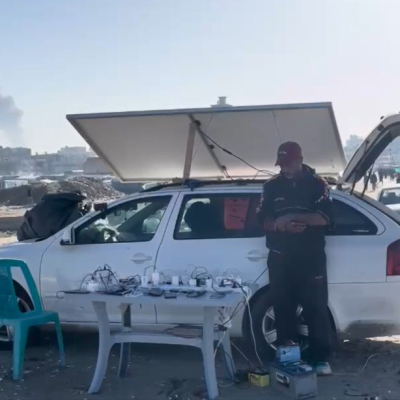
Mahmoud Al-Jari talks about the increasing number of tents for displaced individuals who fled from camps in Bureij and Nusairat to Deir al-Balah. Their need for electricity to charge phone batteries and lamps has risen. He borrowed the idea of charging electricity from a friend, opened this small project to assist citizens, and earn a little money to sustain himself during these wartime conditions.
He goes on to describe that every morning, starting at 6 a.m., he opens his charging station for displaced individuals. He charges phones, batteries, flashlights, and other devices for them, charging only one shekel per hour. The number of devices he charges is approximately 50 or more, and sometimes he cannot accommodate more due to high demand.
Mahmoud Al-Jari explains that the displaced citizens who come to charge their phones consider it their only outlet to check on their relatives, listen to the radio, or play games.
Regarding the charging process and identifying each device owner, Mahmoud Al-Jari states that there is a number on the charger's entrance. He gives them a paper with their number, for example, "Mohammed, number one," along with a charger, cable, receipt, and registration extension.
In the area of the displaced camps, Khaled Al-Shurafa, owner of a solar-powered phone and electrical device charging station, shares his experience. He used to work as a contractor in construction, but due to the harsh conditions resulting from the Israeli aggression on Gaza, he had to switch to his other expertise—solar energy. He innovated a solar energy system from scratch that is safe for use, contributing to serving citizens by providing electrical power for their devices.
Al-Shurafa mentions that he records the names of individuals and their devices on a specific sheet for each charging station, allowing him to know device owners when the charging is complete for them to collect their items.
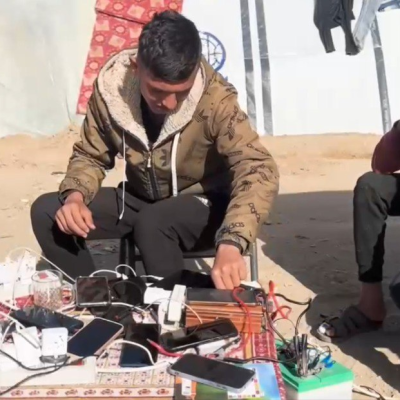
He notes that a smile appears on the faces of mobile owners, even if just a little, after charging their phones. They know the latest news after being cut off due to the ongoing Israeli war on Gaza, which led to power outages since it began on October 7.
Wael Al-Ghafeer, owner of a charging station for phones and electrical devices, concludes his statement by stating that the innovation of the electricity charging project was a result of the displaced individuals' lack of chargers, candles, internet, and communication. This has helped people stay informed about their relatives and provided mutual reassurance. It has also saved a lot in terms of daily expenses for communication, in addition to providing for him and his family.
This story was produced as part of the Qarib program implemented by the French Media Development Agency (CFI) in partnership and funding from the French Agency for International Cooperation (AFD).
